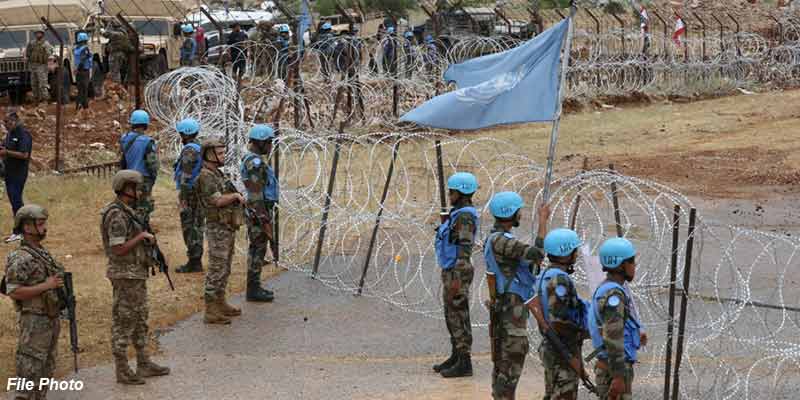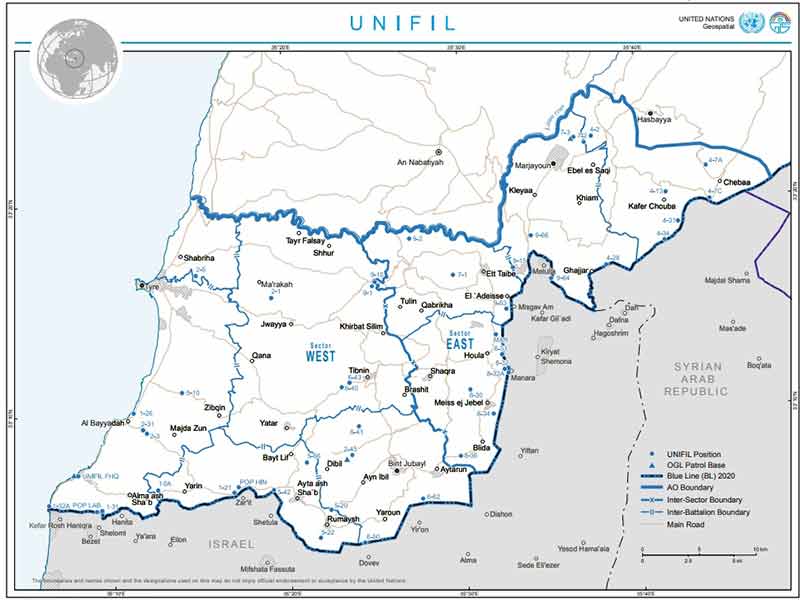- World
- Oct 01
Explainer - The Blue Line in southern Lebanon
• More than one million people across Lebanon have been uprooted by ongoing and deadly Israeli airstrikes across the country.
• Some 100,000 of the displaced have reached neighbouring Syria.
• The development follows a dramatic escalation of hostilities between Israeli forces and Hezbollah along the UN-patrolled line of separation in southern Lebanon known as the Blue Line, against the backdrop of the nearly year-long war in Gaza.
• Hezbollah is a heavily armed militant group that is Lebanon’s most powerful political force.
• Israeli airstrikes in Lebanon have forced thousands to flee their homes, including Palestine refugees living in the country.
• Last week, Israeli airstrikes in southern suburbs of Beirut targeted the leader of the Hezbollah armed group, Hassan Nasrallah, who was killed.
• The UN peacekeeping mission, UNIFIL, which patrols the line of separation between southern Lebanon and northern Israel remains in place. However, the intensity of military action is preventing ‘Blue Helmets’ from carrying out their tasks or moving around their area of responsibility.
• UN Secretary-General Antonio Guterres expressed grave concern over the dramatic escalation of events. Guterres urged the parties to recommit to the full implementation of the UN Security Council resolution in 2006 and immediately return to a cessation of hostilities.
• Resolution 1701 was adopted in August 2006 and aimed to end the war that erupted in Lebanon that year between Israel and Hezbollah. It called for an end to hostilities, the withdrawal of Israeli forces, and the establishment of a demilitarised zone.
What is the Blue Line?
• Following an invasion by Israeli forces into Lebanon, the UN Security Council, in March 1978, established the United Nations Interim Force in Lebanon (UNIFIL) mandating it to confirm the withdrawal of Israeli forces from Lebanon, restore international peace and security, and assist the Lebanese government to restore its effective authority in the area.
• In June 1982, Israel invaded Lebanon for the second time and subsequently established a security zone inside the country, which remained until its withdrawal in 2000.
• In 1985, Israel partially withdrew its forces from Lebanon, but retained control of an area in southern Lebanon controlled by Israel Defence Forces (IDF) and Lebanese De Facto Forces (DFF).
• On April 17, 2000, the government of Israel notified the UN Secretary-General that it would withdraw its forces from Lebanon by July 2000.
• In preparation of the withdrawal of the Israel Defence Forces (IDF) from Lebanon, the UN identified the ‘Line of Withdrawal’, or so-called ‘Blue Line’, largely conforming to the internationally recognised boundaries of Lebanon.
• The United Nations established this Line in June 2000 for the sole purpose of confirming the full withdrawal of the IDF from Lebanese territory.
• The Line is described as the best approximation of the 1923 Boundary Line and the 1949 Armistice Demarcation Line. It does not in any way represent an international border and is without prejudice to any future border arrangements between Lebanon and Israel. The Line is 120 km long.
• Until July 2006, despite numerous violations of the Line of Withdrawal, as well as sea and air violations, and occasional breaches of the ceasefire, the situation in the area remained relatively calm.
• On July 12, 2006, war broke out between Israel and Lebanon after Hezbollah had carried out an attack on an IDF patrol, kidnapping two IDF soldiers and killing three others.
• On August 11, 2006, the Security Council adopted resolution 1701 (2006), which ended the war and in which the Council decided to enlarge UNIFIL (to a maximum of 15,000 troops) and enhance its mandate.
• UNIFIL headquarters is located in Naqoura. The area of operations extends from the Blue Line in the south to the Litani River in the north and is divided into two sectors, East and West.
• The mission has more than 10,000 troops from 50 countries and about 800 civilian staff.
• The mandate for the operation is renewed annually by the 15-member UN Security Council.
Manorama Yearbook app is now available on Google Play Store and iOS App Store


